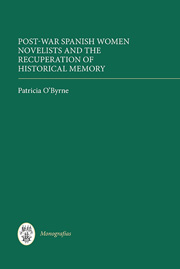Book contents
- Frontmatter
- Dedication
- Contents
- Acknowledgements
- Preface
- Introduction
- 1 Spanish Women Novelists 1940–1960
- 2 Work and Religion: a Right-wing Perspective
- 3 Sexual Abuse and Male Dominion
- 4 Spinsters in Post-war Spain
- 5 Exemplary Mothers and Sexually Liberated Women
- 6 Prostitution, Sexual Ignorance and Sex Outside Marriage
- Afterword
- Works Cited
- Index
Afterword
Published online by Cambridge University Press: 05 August 2014
- Frontmatter
- Dedication
- Contents
- Acknowledgements
- Preface
- Introduction
- 1 Spanish Women Novelists 1940–1960
- 2 Work and Religion: a Right-wing Perspective
- 3 Sexual Abuse and Male Dominion
- 4 Spinsters in Post-war Spain
- 5 Exemplary Mothers and Sexually Liberated Women
- 6 Prostitution, Sexual Ignorance and Sex Outside Marriage
- Afterword
- Works Cited
- Index
Summary
The long overdue Law of Historical Memory (2007) may have opened old wounds but it is to be hoped that in time it will be recognised, even by those who opposed it, as a positive and necessary step in the process of recovery, closure and reconciliation. Article 2 of the legislation specifically alludes to minority groups who were prevented from participating in cultural, linguistic and sexual activities or functions that were proscribed by the dictatorship; it also makes reference to those forced into exile. There is no mention of the suffering of women or their exclusion from participating in many areas of society. Women were not a specifically targeted group but, nonetheless, were victims of the regime's and Church's patriarchal repression, which deeply affected the lives of generations of Spanish women. In sociological studies carried out since the end of the dictatorship, the trend is often to present aspects of women's lives in an ironical, light-hearted vein, as seen in the books of Martín Gaite, Torres or Roldán. Embedded in what now appear obviously ludicrous practices were guilt, fear, confusion and anguish. Women had been infused and indoctrinated relentlessly on many fronts with an ideology aimed to prepare them for lives of abnegation and denial. If these women ventured outside the box or tried to rationalise their life experience, the social and psychological consequences could be extreme. Fear of exposure in the case of a sexual transgression, and of condemnation for non-compliance with expectations, were sources of trepidation and torment. And for some, the fear of eternal damnation was a very real factor.
- Type
- Chapter
- Information
- Publisher: Boydell & BrewerPrint publication year: 2014

